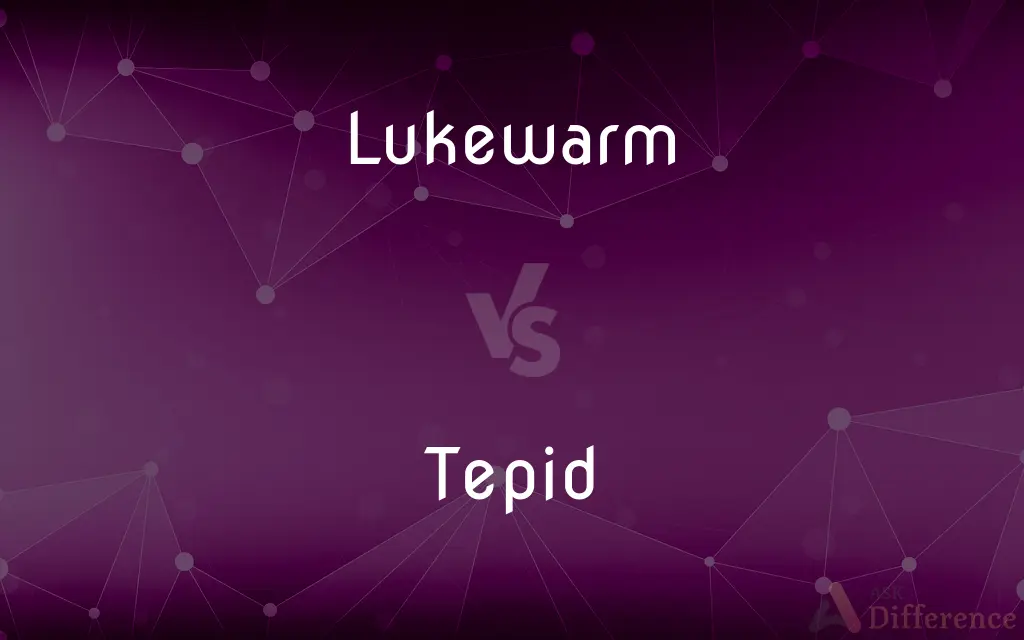Lukewarm vs. Tepid — What's the Difference?
By Fiza Rafique & Urooj Arif — Updated on March 27, 2024
Lukewarm and tepid both describe mild warmth, but lukewarm often implies a more disappointing or insufficient warmth.

Difference Between Lukewarm and Tepid
Table of Contents
ADVERTISEMENT
Key Differences
Lukewarm and tepid are adjectives used to describe a moderate level of warmth, typically less than warm but not cold. While both terms can be used interchangeably in some contexts, lukewarm often carries a connotation of being unsatisfactorily warm, especially when more warmth is expected or desired. On the other hand, tepid is more neutral, simply describing the temperature as mildly warm, often in a more technical or factual manner.
In everyday language, lukewarm is frequently used to describe food, beverages, or water that has cooled to a disappointingly warm temperature, suggesting that it might have been warmer at one point but is no longer pleasantly so. Tepid, while it can also describe food and beverages, is often used in scientific, medical, or technical contexts to describe a specific range of mild temperatures, without the implication of disappointment.
The term lukewarm often appears in expressions conveying lackluster enthusiasm or mild support, reflecting its negative connotation in terms of temperature. Tepid, while it might be used similarly, is less commonly associated with attitudes or emotions and more with physical descriptions of temperature.
In terms of usage, lukewarm might be chosen to convey a subtle dissatisfaction or a wish that something were hotter, while tepid would be used when the speaker intends to describe a temperature that is intentionally or acceptably mildly warm, without suggesting it should be warmer.
Despite their nuanced differences, in many practical scenarios, the choice between lukewarm and tepid comes down to personal preference or the specific context of the conversation, with both terms helping to describe temperatures that are between warm and cool.
ADVERTISEMENT
Comparison Chart
Connotation
Often implies disappointment or insufficient warmth.
Neutral, describing a mildly warm temperature.
Common Usage
Describing food, beverages, or water that’s lost its warmth.
Used in scientific, medical, or technical descriptions.
Emotional Association
Can imply lackluster enthusiasm or support.
Less commonly associated with emotions or attitudes.
Preference in Use
When more warmth is expected but not met.
When describing intentionally mild temperatures.
Context
Everyday language, metaphorically for attitudes.
Scientific, factual descriptions of temperature.
Compare with Definitions
Lukewarm
Mildly warm, often in a disappointing manner.
The coffee was only lukewarm by the time she took a sip.
Tepid
Showing little enthusiasm or vigor; lukewarm.
The crowd's tepid reaction didn't discourage the performer.
Lukewarm
Showing little enthusiasm or warmth in feelings.
His reception to the idea was lukewarm at best.
Tepid
Of a temperature that is moderately warm, often intentionally so.
The laboratory samples were kept at a tepid temperature.
Lukewarm
Used metaphorically to describe tepid emotions or reactions.
The audience's applause was lukewarm, reflecting their mixed feelings.
Tepid
Not hot, not cold; maintaining a mildly warm state.
The soup was tepid, but she ate it anyway due to hunger.
Lukewarm
Barely or unenthusiastically warm or favorable.
The proposal received a lukewarm response from the committee.
Tepid
Used to describe a lack of passion or intensity.
His support for the project was tepid, lacking real commitment.
Lukewarm
Not quite hot, not quite cold; tepidly warm.
She preferred her bath water to be lukewarm.
Tepid
Slightly warm; lukewarm, especially in a neutral context.
He rinsed his hands under tepid water.
Lukewarm
Mildly warm; tepid.
Tepid
Moderately warm; lukewarm.
Lukewarm
Lacking conviction or enthusiasm; indifferent
Gave only lukewarm support to the incumbent candidate.
Tepid
Lacking in emotional warmth or enthusiasm; halfhearted
"the tepid conservatism of the fifties" (Irving Howe).
Lukewarm
(temperature) Between warm and cool.
Wash it in lukewarm water.
My curry is lukewarm.
Tepid
Lukewarm; neither warm nor cool.
I'm drinking a cup of tepid water.
Lukewarm
Unenthusiastic (about a proposal or an idea).
The suggestion met with only a lukewarm response.
Tepid
Uninterested; exhibiting little passion or eagerness; lukewarm.
He gave me a tepid response to the proposal.
Lukewarm
Moderately warm; neither cold nor hot; tepid.
Tepid
Moderately warm; lukewarm; as, a tepid bath; tepid rays; tepid vapors.
Lukewarm
Not ardent; not zealous; cool; indifferent.
An obedience so lukewarm and languishing that it merits not the name of passion.
Tepid
Moderately warm;
He hates lukewarm coffee
Tepid bath water
Lukewarm
Moderately warm;
He hates lukewarm coffee
Tepid bath water
Lukewarm
Feeling or showing little interest or enthusiasm;
A halfhearted effort
Gave only lukewarm support to the candidate
Common Curiosities
What does lukewarm mean?
Lukewarm describes a mild level of warmth that is often considered disappointingly warm or lacking desired heat.
Are lukewarm and tepid interchangeable?
While they can be used interchangeably in some contexts, lukewarm often carries a negative connotation, unlike the more neutral tepid.
Is tepid water suitable for bathing?
Tepid water, being only slightly warm, might not be suitable for all, especially those who prefer warmer bathing temperatures.
Can emotions be described as lukewarm or tepid?
Yes, both terms can describe emotions, but lukewarm more commonly implies a lackluster or half-hearted feeling.
Is one term more formal than the other?
Tepid might be considered more formal or technical, especially in scientific or medical contexts.
What does tepid mean?
Tepid refers to a mildly warm temperature, generally used in a neutral context without implying disappointment.
Which term is more likely to describe a scientific measurement?
Tepid is more likely used in scientific or technical contexts to describe a specific temperature range without emotional connotations.
How do the terms relate to enthusiasm?
Lukewarm is commonly used to describe mild or indifferent enthusiasm, while tepid can also be used but is less common in this context.
Can the term lukewarm imply a change in temperature?
Yes, lukewarm often suggests that something was warmer before and has cooled to a less satisfactory level.
Can weather be described as lukewarm or tepid?
Weather is less commonly described with these terms, but they could be used metaphorically to describe mild conditions.
Share Your Discovery

Previous Comparison
Manilla vs. Vanilla
Next Comparison
Path vs. TrailAuthor Spotlight
Written by
Fiza RafiqueFiza Rafique is a skilled content writer at AskDifference.com, where she meticulously refines and enhances written pieces. Drawing from her vast editorial expertise, Fiza ensures clarity, accuracy, and precision in every article. Passionate about language, she continually seeks to elevate the quality of content for readers worldwide.
Co-written by
Urooj ArifUrooj is a skilled content writer at Ask Difference, known for her exceptional ability to simplify complex topics into engaging and informative content. With a passion for research and a flair for clear, concise writing, she consistently delivers articles that resonate with our diverse audience.














































